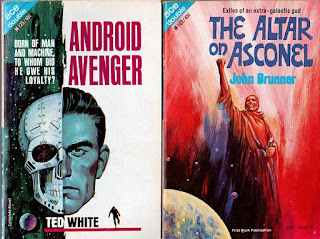A Review by Rich Horton
 |
| (Cover by Donato Giancola) |
I quite enjoyed "Historical Crisis", though I found it a bit melodramatic, and a bit too rapid. I also noticed immediately that it was based in an odd way on Asimov's Foundation universe. As I recall, no mention of that was made in the anthology, and I wondered if Kingsbury had gotten permission -- the similarities are so close as to require that, I would have thought. Psychohistorical Crisis, at any rate, is advertised by Tor as being based on the Foundation stories, so there is no question of concealment. It's also much slower than "Historical Crisis" -- so the "too rapid" problem is solved, possibly too well. (I found the novel always enjoyable to read, but also easy to put down -- it does take quite a while to get where it's going, though the journey is fun, and it's long -- about 230,000 words.)
The book is set from 14790 GE to 14810 GE. This is about 2700 years after the death of the "Founder" and the near simultaneous establishment of the equivalent of the "First Foundation" on a planet called Faraway. It's about 1600 years after the formal establishment of the Pax Pscholaris, the "Second Empire" under the rule of the Psychohistorians called Pscholars, the equivalent to Asimov's Second Foundation. Thankfully, Kingsbury's universe does not include the equivalent of (ack, ptui!) Asimov's evil hive mind, Gaia, nor does it include a robot like R. Daneel Olivaw pulling the strings (except for a cute reference, in which a silly robot character is named Danny-boy). Also thankfully, Kingsbury recognizes that the rule of the Pscholars is stifling. Indeed, he is very interested in treating Psychohistory with some seriousness, and in asking how well the secret society of Pscholars can really keep psychohistory secret, and how ultimately stable their rule will be.
The key variation Kingsbury plays on Asimov's idea is to replace the Second Foundation's (ack, ptui!) psychic powers with a technological means of providing them with similar power. In Kingsbury's future, Asimov's Mule is replaced by a fellow called Cloun the Stubborn, who gets ahold of a device which can be used to control a person (by direct neural input): the tuned psychic probe. It's still pretty squishy science, but not ridiculous. The scientists of Faraway (and elsewhere) develop the psychic probe into something called the "familiar", or "fam" -- sort of a PDA with extra memory and processing which links directly to the brain. You adjust to it from the age of 3, and your personal adjustment theoretically makes it impossible for anyone else to exercise control over you through it. Pretty much everybody in rich societies has one, and indeed it is all but impossible to get around Splendid Wisdom (Kingsbury's version of Trantor) without it.
The story begins with the trial of a young psychohistorian named Eron Osa. He is condemned to death, and summarily executed -- by having his fam destroyed. His body, with its near useless "wet" brain, is allowed to live. He cannot even understand his crime -- all the data about it was in his fam.
Soon he is desperately trying to relearn normal living skills, as he also begins to receive strange messages.
The story soon is following four points of view, 20 years in the past. We follow Eron Osa as a 12 year old boy on the planet Agander, as he yearns to become a psychohistorian. We follow Eron's tutor, Murek Kapor, who is in secret Hiranimus Scogil, the member of a secret group trying to develop psychohistory independently and to counteract the Pscholars' efforts. We follow Admiral Hahukum Konn, the second most powerful Pscholar, and an enthusiast for ancient weapons systems, as he searches for a worthy student to learn his eccentric interpretation of Psychohistory. And we follow the elderly Hyperlord Kikaju Jama, an antiques dealer who is interested in upsetting the static social order, especially after he discovers a strange device that shows the stars of the Galaxy, and that hints at a secret planet hidden by the Pscholars. We also follow a fifth thread, as events in the "present" lead toward a climax.
Eron is soon led by Scogil to Faraway, to learn proper Physics, from where Hahukum Konn recruits him. Scogil also runs into Kikaju Jama, and they jointly find the secret planet, which hides a greater secret: a trove of ancient psychohistorical lore. So Scogil and his society join tentatively with Jama's group, and begin to use their new knowledge of Psychohistory to try to slowly destabilize the Second Empire. All this time Konn is teaching Eron Osa, including a trip to Rith (i.e. Earth) where they reconstruct a B-17 for fun and psychohistorical exercise. And Osa begins to develop a theory which will be unpopular both with Konn and with the more hidebound Pscholars.
All is eventually in place for the action of the climax, which is exciting, even though full of math, and which reveals Kingsbury doing some interesting thinking. It's really quite fun, and the world Kingsbury creates is fascinating. There is a lot of somewhat strange sex -- Kikaju Jama, in his 60s, likes to seduce teenage girls (as in about 13), while Eron Osa at age 13 or so has affairs with girls his age and women twice his age. It should be said that in this society pubescent boys and girls both appear to be considered eligible for consenting sexual activity, and there is no hint that any of the sex in the book is nonconsenting (with perhaps a tiny, plot important, wiggle). I quite liked Kingsbury's names: the Frightfulperson Otaria of the Calmer Sea being a particular example. Fun stuff, and in many ways an improvement on its model.



